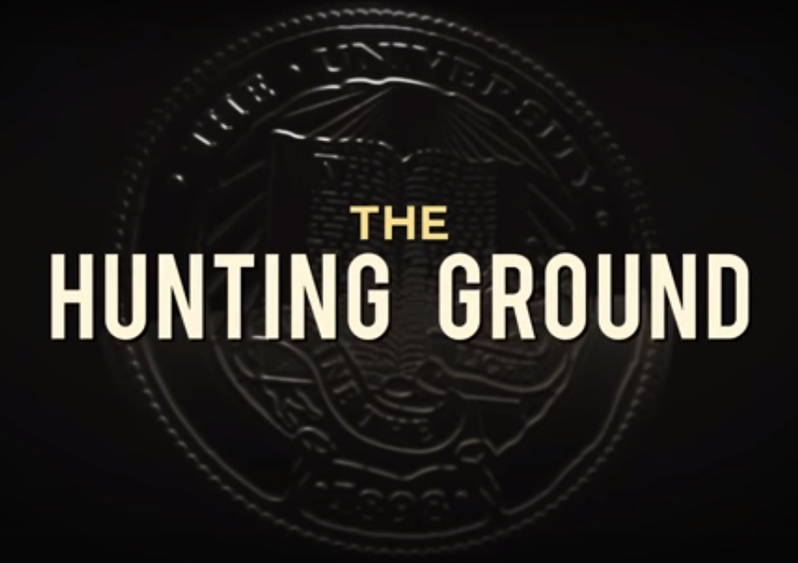Truthdiggers of the Week: The Filmmaking Team and Subjects of ‘The Hunting Ground’
The documentary shines a light on the prevalence of rape and other sexual assaults on campuses across the nation, and puts faces and voices to the pain-filled stories we hear so frequently.
Every week the Truthdig editorial staff selects a Truthdigger of the Week, a group or person worthy of recognition for speaking truth to power, breaking the story or blowing the whistle. It is not a lifetime achievement award. Rather, we’re looking for newsmakers whose actions in a given week are worth celebrating.
My first week at UCLA, I attended a “welcome week” event in which the hundreds of freshmen seated in the auditorium were asked to stand up if they or anyone they knew had ever been sexually assaulted.
Two things took me by surprise: the sheer number of incoming students who’d been exposed to sexual assault and their bravery in publicly acknowledging it.
I didn’t stand up that day, but by the end of my college education I could have, because more than one person I met in my five years as an undergraduate became a victim of rape or another form of sexual assault.
The documentary “The Hunting Ground,” directed by Kirby Dick and produced by Amy Ziering, focuses on how academic institutions mishandle sexual assault reports. As I watched the film this week, I couldn’t help but recall how I felt that day at UCLA.
Though no longer surprised by the statistics—that 16 percent of college women become victims of sexual assault, that 88 percent of cases go unreported—and after reading for years about the victim shaming that occurs on campuses on an administrative level, it was impossible not to feel shocked by the gross injustices taking place on college campuses.
The film does an excellent job of portraying the hard truths many women learn during their time at university, as well as afterward, with regard to sexual assault. On many campuses, there is a lack of support for—but more importantly, a lack of respect toward—victims who come forward. If you don’t believe this, one look at the number of assaults reported compared with the number of perpetrators expelled might change your mind.
As an informed viewer who has taken a strong interest in incidents of campus sexual assault, I expected the figures that I saw on screen, but I was once again struck by the strength of the victims willing to fight for their rights and come forward to share their experiences on film.
That is one of the strengths of the documentary: While presenting facts and figures about how the problem plays out on campuses across the nation, it gives faces and voices to the pain-filled stories we hear so frequently.
It’s not just female and male victims who are interviewed. College administrators, a security officer, a clinical psychologist, attorneys, parents of victims and others are asked for their opinions. Many seem saddened and outraged by how universities respond—or fail to respond—to sexual assault allegations.
“The Hunting Ground” also highlights the psychological and physiological impact of the crimes and traces how these effects can be exacerbated by college officials’ seeming indifference. Add to that the trauma of having to continue attending school alongside an assailant.
Another issue underscored in the film is the fact that many perpetrators are repeat offenders. When the statistic showing that fewer than 8 percent of college men commit 90 percent of the sexual assaults on campus flashes on the screen, the message becomes clear: If universities took these reports more seriously, many assailants wouldn’t be able to assault more than one person.
But, as several people who appear in the film explain, universities have a financial incentive to keep these cases hushed. “Will parents send their daughters to a university with a high rape rate?” is a question that seems to trump administrators’ concern for the safety and well-being of their students. The film also highlights the roles fraternities and athletic departments play in pressuring administrators who handle sexual assault reports.
The film’s unifying thread is the activist work carried out by Andrea Pino and Annie E. Clark, two young rape survivors who attended the University of North Carolina. The former UNC students filed a Title IX complaint against their university and began to “connect the dots” between cases of people who reached out to them from across the nation to share their stories. “When you see how many people are being impacted [by sexual assault],” says Pino, “you start to see it as an epidemic.” In addition to setting an example by filing the Title IX complaint, the two women went on to help students at other U.S. universities file complaints against their own schools.
Another strength of the film is how, like Clark and Pino, the filmmakers trace connections between stories by overlapping snippets of testimony to show how details often are so similar. The effect is twofold: It becomes clear that these are not isolated cases, and it also helps make assault survivors aware that they are not alone in their struggle, something viewers hear Pino and Clark repeatedly tell callers who reach out to them.
The film has received criticism regarding the factual accuracy of one of the cases, as well as for its focus on advocacy. In November, however, the filmmakers issued a statement rebutting claims made in a letter by 19 Harvard University law professors about the content of the documentary, stating that “everything in The Hunting Ground is accurate and thoroughly vetted” and that they “fully stand behind [all the cases] featured in the film.” The filmmakers’ statement closed with a strong condemnation of the “institutional denial” that, in their eyes, the professors’ letter proved.
In a piece for The Huffington Post, Harvard graduate Elizabeth Nicholas writes that critiques like the professors’ serve to prove what she considers the documentary’s central point: “whistle blowers on campus sexual violence are demonized and delegitimized by the very same universities who are going on the offensive.”
Expressing a sentiment that resonated for me as well, Nicholas wrote that “as a young woman, it is jarring to learn that there are people who doubt that sexual violence is common, and stranger yet to learn there are people who are skeptical it should be taken seriously.”
And that is precisely why “The Hunting Ground” filmmakers and the women and men who came forward to share their traumatic stories should be lauded for their bravery and advocacy: Speaking out against people and institutions that allow this epidemic to continue is the most important step in addressing the issue of sexual assault on campus. As one of the survivors explains, the media coverage of their activism helped them realize that what was “effective” was “personal narrative and putting a face and a name to the issues.”
Pino and Clark have taken other steps in their activism, working to get the Campus Accountability and Safety Act reintroduced in Congress, a proposed law that, if enacted, could strongly affect how universities report and assess sexual assault cases.
For taking key steps in fighting the prevalence of virtually unpunished sexual assault cases on college campuses, Pino, Clark, “The Hunting Ground” filmmakers and all those involved in the documentary’s development are our Truthdiggers of the Week.
Your support matters…Independent journalism is under threat and overshadowed by heavily funded mainstream media.
You can help level the playing field. Become a member.
Your tax-deductible contribution keeps us digging beneath the headlines to give you thought-provoking, investigative reporting and analysis that unearths what's really happening- without compromise.
Give today to support our courageous, independent journalists.

